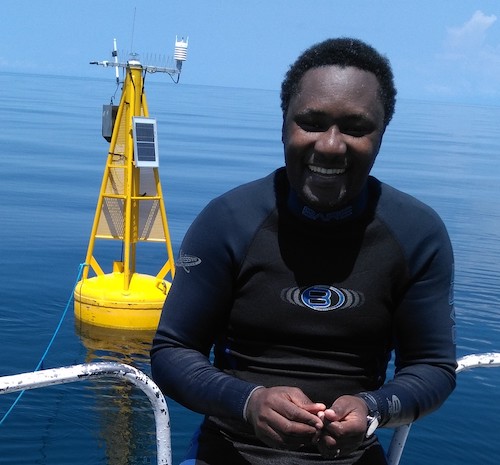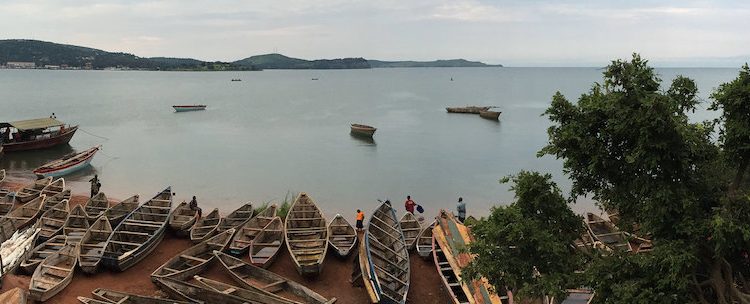 Dr. Ismael Kimirei is a prolific researcher and is currently the Director General of the Tanzania Fisheries Research Institute (TAFIRI) in Dar es Salaam. This is a prestigious position that he has held since the beginning of this year and after having served as Senior Scientist and Director of the Institute’s Center in Kigoma, on the eastern shores of Lake Tanganyika, where he has worked for the past two decades. TAFIRI is a government institution mandated with conducting research and advising the government on all fisheries and aquaculture matters, and has shaped the fisheries policy landscape of the country for many years.
Dr. Ismael Kimirei is a prolific researcher and is currently the Director General of the Tanzania Fisheries Research Institute (TAFIRI) in Dar es Salaam. This is a prestigious position that he has held since the beginning of this year and after having served as Senior Scientist and Director of the Institute’s Center in Kigoma, on the eastern shores of Lake Tanganyika, where he has worked for the past two decades. TAFIRI is a government institution mandated with conducting research and advising the government on all fisheries and aquaculture matters, and has shaped the fisheries policy landscape of the country for many years.
We caught up with Ismael, who shared insights on how a small START grant and a key connection triggered much larger opportunities and impacted his career trajectory.
START: Thank you for affording the time to conduct this interview. Please tell us about your involvement with START.
I.K.: In 2012, while working with TAFIRI in Kigoma, I received a “partnership enhancement grant” from START to collaborate with Prof. Catherine O’Reilly from Illinois State University.
Our work, as part of the grant, involved writing a funding proposal to raise money to conduct climate change-related research in Lake Tanganyika. The grant also covered a short visit to the United States during which we actively fundraised with institutions in Chicago such as the McArthur Foundation, and attended a course on data analysis and lake observation systems at Lake Lacawac Sanctuary in Pennsylvania.
Unfortunately, we were not successful with fundraising at that time. However, thanks to the connections made while working under the grant, I met Prof. Peter Stæhr from Denmark, and together with him and Prof. Catherine O’Reilly, we received funding from the Danish International Development Agency (DANIDA) to conduct a five-year study on projections of climate change effects on Lake Tanganyika. This project, called the CLEAT project, ended in 2019 and is being extended for one year; it has resulted in five published peer-reviewed papers, five submission-ready manuscripts, a children’s book, three Ph.D. theses and in follow-up grants.
START: Can you tell us more about the work you are doing in Lake Tanganyika, under this DANIDA-funded project, and its impacts on policies and decision-making?
I.K.: We have been looking at how climate change affects the functioning and biodiversity of Lake Tanganyika, and how this affects primary production, ultimately leading to fish production. Three PhD students have been working on different aspects of the project, from biogeochemistry to socio-economics, and we have been modelling climate change scenarios, for example, for 2050 or 2100, at 1.5- and 2.0-degrees temperature increases.
We recently presented our results to our parent Ministry here in Tanzania, which was reviewing fisheries policies and regulations. I am glad to report that our recommendations towards sustainable fisheries were taken onboard. Also, we are going to share the information with the Lake Tanganyika Authority, and we may see a lake-wide enforcement of the policy recommendations. We are also writing a children’s book on Lake Tanganyika to disseminate the work that we did.
This is the result of the project funded by DANIDA, and not a direct result of the START grant. However, if it were not for the 2012 START grant and working with Catherine, we probably wouldn’t have met our Danish colleague, and we might not have received the funding for the five-year project. So, the START grant had a huge part in what I am doing now.
START: How did the START grant impact your work and your career trajectory?
I.K.: The grant provided an opportunity to work with Catherine O’Reilly – I knew her, but we had not worked together before – and the time spent in the US opened many doors, although it didn’t directly bring the funding we were looking for.
Also, our laboratory in Kigoma highly benefitted from the project. If it were not for the link with START and working with Catherine, we would still be lagging in water quality data and climate change research.
Moreover, the grants inspired several spinoff projects and networks, with activities such as student exchanges, attaching students to our lab to enhance their exposure as they worked on running projects. This was made possible by my interaction with Prof. O’Reilly; I wish there were more enhancement grants creating this sorts of connections in Africa.
START: As a final parting shot, what would be your advice to START and other organizations working to develop capacities to tackle sustainability challenges?
I.K.: Start with small grants to assist those who have nothing to make an impact; the grant I received back in 2012 was US$5,000 and you can see how much more funding and opportunities have come from that. Small contributions can generate bigger opportunities, and ultimately trigger lasting impact.
About the Partnership Enhancement Awards
Robust partnerships are critical for advancing knowledge about processes related to global environmental change, many of which occur across regions. In 2012 START availed competitive small grants to five African scientists to enable the development or strengthening of partnerships with US scientists and/or graduate students for collaborative GEC research. Activities supported by the program included a two to four weeks visit at US host institutions, collaborative proposal development, interactive training or analysis, preparation of joint publications, and related activities that stimulated Africa-US partnership in collaborative research. The program fostered greater integration of science and scientists from Africa with international research and assessment projects and, in so doing, enhancing research, training, and networking opportunities for awardees. The 2012 round of Partnership Enhancement Awards was specifically targeted toward climate change, agriculture, and food security research.



